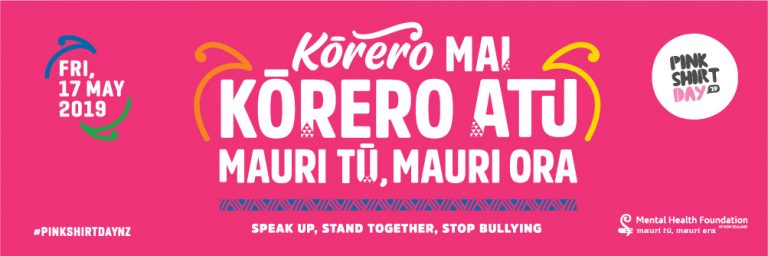Organisational Policy and Procedures
Pink Shirt policy
With pink shirt day on Friday, we’re reminded of the harms of bullying. We must be proactive and respond when bullying occurs in the workplace, at school or another area of life.
Everyone needs a bullying policy…
To help set some ground rules for safety and conduct, every organisation should have a harassment and bullying policy. Here’s what we think are some essentials for a bullying policy:
- the intent of the policy should be clearly stated eg wellbeing at work, that bullying is not tolerated, bullying complaints are dealt with fairly, protection of rights.
- bullying is defined to include conduct that is intimidating and unwelcome. Important here is that bullying can be intentional or unintentional. Conduct may be through texting, emails, social media etc.
- the steps that can be taken if and when bullying occurs must be spelt out. A complainant’s wishes and their right to safety should be central. Due process for a respondent must also be observed. In some situations, there may be opportunity for complaint through an external body eg Human Rights Commission or Netsafe. These avenues should be included in your policy.
- prevention strategies and the obligation to build a culture of respect and tolerance should be also be covered. This is the proactive part. It’s what everyone must take ownership of in the workplace.
A bullying policy must apply across the organisation – to governance, management, staff and volunteers. The policy should require the organisation’s leaders and governors to champion a culture of respect and tolerance, ensure a fair and timely follow up on complaints and to model that bullying, under any pretence (eg stress, anxiety, fun) is not ok.
We can help!
Bullying and harassment is covered in our core set of policies at the Policy Place. Join up to our online service so all of your staff can access the latest in policy development. Online access is a great way to get everyone on the same waka going in the right direction – so important when it comes to providing safe and tolerant workplaces.
Give us a ring at the Policy Place to discuss your policy needs and find out more about how we can assist.
Impact of youth-related reforms
What will be the implications of the youth-related changes in the Oranga Tamariki reforms? Now is the time to review your organisational policies if you want to get on board.
Today, I’m going to overview the changes. I consider how they address a key area of positive youth development – belonging – and the implications of the reforms for community and community services.
The Oranga Tamariki (OT) reforms.
The upcoming OT reforms establish new legislative principles and include age changes for leaving care, aftercare support and youth justice. The changes support positive youth development, in particular, “belonging” as a key developmental area for our youth.
Belonging in what sense?
The new legislation addresses three meanings of belonging for our rangatahi/youth:
- the tangible – physical spaces we occupy and to which we connect – home, turangawaewae, whenua, land, community, neighbourhood, country
- the relational – our membership and connections with whānau, family, hapū, aiga, peers and spiritual beliefs. This is the basis on which a young person can say “I am loved” (according to the Circle of Courage, a positive youth development approach)
- the restorative – recognising a feeling of belonging is essential to resilience, the ability to cope with life and pain and to recover from trauma, mental health and addiction issues.
New principles
The new principles of the Act will guide the Ministry in the exercise of its powers and functions. Some of them apply generally to children and young people and some are specific to young people involved in youth justice, and to youth who are 18 years and over transitioning from care.
A young person’s need to belong in tangible, restorative and relational senses is recognised and supported:
- young people should be increasingly supported to make their own decisions
- young people should be supported to address the impacts of harm
- the relationships between a young person and their family, whānau, hapū, iwi and family group should be supported and strengthened where appropriate
- their mana must be protected by recognising the young person’s whakapapa and respecting whanaungatanga responsibilities
- respect for a young person’s identity- gender, culture, sexuality, language, religion etc
- recognise and address barriers to inclusion and participation that can be faced by disabled children.
Raising age for youth justice
From 1 July, most 17-year-olds who offend will come into the Youth Court jurisdiction. This is a long overdue reform and will hopefully lead to further reforms enabling even older youth to be dealt with in the youth system in preference to adult courts.
The youth system, like the adult system, holds offenders to account. However, there’s more scope in the youth system for the tangible, relational and restorative aspects of belonging for a young person to be recognised and addressed. In other words, more scope for positive youth development.
Instead of having to appear in the adult courts, from 1 July, most 17-year-olds will be either diverted by police (as an Alternative Action) or, be referred directly to a family group conference before any charge can be laid against them. A family group conference has the potential to address a young person’s need for belonging: their tangible need for a place to call “home, and for trusting relationships to support them to take responsibility for wrongdoing, make amends and if appropriate, provide reparation to victims.
Age increase for leaving care and support for independence
The new legislation finally makes our country compliant with the UN Convention on the Rights of the Child, making Oranga Tamariki the responsible parent it was always meant to be.
The care and protection system will apply to 17-year-olds. The reforms also provide a lot more support for rangatahi to transition from care to independence. A young person in care will be entitled to live with a caregiver up until age 21 and to access advice and assistance up until 25 years.
Oranga Tamariki already makes some provision for young people to be supported to transition from care. But the support to remain with a caregiver and provision for assistance until 25 years old are big shifts.
Supporting the young person’s path to independence is the kaupapa and addressing their need for belonging (in a tangible, relational and restorative sense) is crucial:
- maintaining their sense of home (tangible) with an existing caregiver
- supporting and building trusted relationships (eg whānau, aiga and others that exist)
- supporting the young person to address the impacts of harm
Implications for community and youth services
The changes are going to have a significant impact on OT itself. Funding for the changes was announced by the Minister of Children earlier this year.
Most youth services already work with rangatahi up to 25 years. But there may be impacts on these and other services, for example, more demand for:
- youth-friendly placements and care opinions
- health services to extend and open up to 17-year-olds (instead of making 18 the magic age for accessing a service)
- for iwi and others who are delegated to run FGCs
- for youth and other services who assist young people transitioning from care.
Buy-in from the community is crucial if these reforms are going to work. Rangatahi are part of families, whānau, hapū and family groups. It is at these levels therefore that the potential of the reforms to support young people’s sense of belonging and positive development has to be activated. Adequate resourcing and funding by government and local authorities for the community to do so is vital.
Review your organisational policies
If your organisation wants to be part of these changes it is a good idea to review your policies and procedures.
Some issues to consider include:
- your definition of a young person
- if you’re wanting to get on board with the extended youth justice jurisdiction, whether your policies adequately address legal obligations such as reporting and intersect with the court
- do the changes impact on your duty of care
- how you address youth participation
- whether your policies adequately support youth inclusive practice for the diversity of youth in this country
- the alignment of your policies and practices with the new legislative principles (general and specific youth principles).
Do you want policy help?
Contact The Policy Place if you need help with reviewing and updating your policies to support service provision to rangatahi. We want to awhi you in order to support some of our most disadvantaged young people. Let’s work together on this!
Some exciting changes and lots to do
Cultural competency and the Oranga Tamariki reforms –
are you ready?
Earlier this year, we listed some changes coming your way with new legislation. In this post, we look at Oranga Tamariki reforms relating to Te Tiriti o Waitangi. We’ll update you about other changes in subsequent posts.
The context
As we know, the youth justice and care and protection systems have had a disproportionately adverse effect on tangata whenua. Those impacts reverberate today in inequalities across key areas of life like health, education and wealth.
But we also know about the strength and survival of Māori; that despite colonisation, Māori culture, identity and practices survive and flourish; and that access to identity, whakapapa and culture is integral to the wellbeing of tamariki and whānau Māori.
Addressing inequality
The reforms tackle the inequality between Māori and non-Māori in the care and protection and youth justice areas head on. Under the new legislation, the kāwanatanga (governance) responsibilities of Oranga Tamariki, as a Crown agency, will include:
- setting goals to reduce disparities
- measuring progress on this for tamariki and rangatahi Māori
- publicly reporting on progress at least once a year
- having regard to Māori culture and values (tikanga Māori), in particular to mana tamaiti (tamariki), the whakapapa of Māori children and young people, and the whānaungatanga responsibilities of their whānau, hapū and iwi.
The Ministry is expected to up its game and has been reporting progress. So how can the rest of us, as government-funded organisations, also play a part? Reducing inequalities requires our collective effort:
Nāu te rourou, nāku te rourou, ka ora ai te iwi
With your food basket and my food basket the people will thrive.
How culturally competent are we?
This will, of course, be different for everyone. But like any other competency, there are some basics that need to be met.
These are set out for funded agencies in the cultural competence standard of the Social Sector Accreditation Standards – Level 2, which is the equivalent of Standard 8134.1.4 of NZ Health and Disability Standards applied to Ministry of Health-funded agencies.
The basics
The cultural competence standard is comprehensive. Organisations must have policies and procedures in place to ensure work is carried out in a culturally competent and culturally safe manner. Treaty concepts of partnership, participation and equality of outcomes are core.
Agencies must meet requirements like:
- collecting data about the cultural identity of clients and using this to help service planning and development
- providing access to cultural supervision and cultural advice
- cultural diversity in staffing
- using Māori practice models and tools to support connection with whānau, hapū and iwi
- having cultural networks and relationships eg with iwi and kaupapa Māori, Pacific services.
Can we up our game?
There’s always room for improvement. No matter what our competency level, there’s always more ways in which we can learn and grow and become more responsive and inclusive.
Where to start?
A good starting point is to review and reflect on our values and performance. Even better, if we can join others in on it. Questions like the following can help:
- what does data tell us about who is accessing the service and who are applying for and being recruited to staff roles
- what’s indicated by feedback and complaints from tamariki and whānau Māori
- what’s the state of our relationships with mana whenua and kaupapa Māori organisations
- could cultural advice and supervision be used more
- what do we know about practically applying the concepts of mana tamaiti / tamariki, whakapapa and whanaungatanga
- could tikanga practices and reo become more part of our BAU and how can we make this happen.
The next step is to act on what’s identified from the review. It doesn’t have to be big. It’s just important to keep moving forward.
And keep the end goal in sight: ending the injustice of inequality, of honouring every child and young person’s right to be safe and thrive.
Rangatiratanga
Although the majority of children in care identify as Māori (69%), the Ministry reports that only 21% of its funded services are Māori organisations[1]. The new legislation looks set to change this.
It requires the Ministry to take steps to develop strategic partnerships with iwi and Māori organisations. Already, partnership agreements have been made with Te Rūnanga o Ngāi Tahu and Te Rūnanga-Ā-Iwi O Ngāpuhi.
It is a time of opportunity, for more services by Māori for Māori and for new and different ways of working, planning and investment in care and protection and youth justice services. It is exciting, will undoubtedly be challenging and gives us all the opportunity to learn and grow.
[1] Oranga Tamariki. Improving outcomes for tamariki Māori, their whānau, hapū and iwi. Engagement and feedback document. Dec 2018
In our next post…
___________________________________________________________________________
In our next post we will update you on the age change provisions in the Oranga Tamariki legislation. This is another positive change, likely to have significant implications for agencies.
Challenging hate through workplace change
What’s the difference between stereotyping, prejudice and hate speech and does it matter?
Yes, it does matter. In the words of our Chief Human Rights Commissioner:
“It is a matter of life, death and human rights. Disrespectful words and actions give permission for discrimination, harassment and violence.”
We have plenty of examples in our history that prove it. In Aotearoa, stereotyping and hate speech have been part of the colonial wars against Māori. Likewise, integral to the white Australia policy and the killing of its aboriginal peoples. Most recently, prejudice was the justification for killing 50 Muslim people in Christchurch.
So what should we be doing about prejudice and stereotyping in a democracy where freedom of expression and opinion is so valued and necessary?
The big picture
There’s the law. It’s geared to stopping the harmful effects of prejudice and stereotypes e.g denial of opportunity, inciting others to hate. Paul Hunt, the Chief Human Rights Commissioner and the United Nations recommend that the laws relating to hate speech and racial hatred need improvement in New Zealand.
There’s also government policies and programmes. These aim to facilitate inclusion and promote diversity. Examples are the Refugee Re-settlement Strategy, Māori TV, population-based ministries and government-sponsored campaigns around issues like domestic violence and sexual harassment.
The everyday
Members of the Muslim community have publicly shared about the commonplace denigration of their religion and ethnicity. Their experience is not unique as a minority living in NZ. Our culture still seems to give voice and power to anglocentrism.
Our mahi at the Policy Place is workplace/organisational policies and procedures. So my question is – what can we do in our everyday work space to support change and transformation?
Organisational courage
Some obvious things – develop and implement organisational and workplace policies on diversity and inclusion, honouring Te Tiriti o Waitangi, addressing harassment and bullying. But this can’t just be a compliance exercise, a tick box.
The policies must be truly embedded in the organisation, part of the organisational pulse. This takes training, ongoing team kōrero, education.
A systemic approach and commitment to ongoing learning and improvement are required.
So is courage. We need the courage to say “no” to the perpetration of stereotyping and prejudice, to question and challenge it in the everyday. We need the courage to say “yes”, “tino pai” to truly embracing diversity.
Balancing privacy with family, whānau involvement
It can seem hard to balance a strong rights orientation, especially the right to privacy, with a family, whānau inclusive approach.
This post looks at how your organisational policy and procedures can help.
Balancing privacy with family, whānau involvement
How can we respect a client’s right to privacy but engage meaningfully with their whānau? A conundrum recently noted by the Mental Health inquiry.
The right to privacy especially in the health and personal wellbeing area is regarded as sacrosanct. It is important to clients’ trust in social and health practitioners. It helps free people up to kōrero about the things they need to, and move on from whatever ails them.
But the problem with privacy is its individualistic focus. It can leave a person, the client, feeling lonely.
The right to privacy, tends to reinforce views of the client as an individual and separate being first, with their relationships coming second. It helps “protect” or separate the individual from their connections to the extent the client wants this. Whether family, whānau, hapū are involved or connected in with the client, depends on the client’s choice and their activation.
As noted by the Mental Health Inquiry and many other reports, this approach can mean that family and whānau are left out in the cold about what’s going on with their person and how they can meaningfully support them. It is unhelpful to the healing process in both the short and longer term.
Organisational policy and procedures
So how can organisational policy help organisations balance the right to privacy with involving family and whānau in work with clients?
The evidence is clear: people want to connect, they need to (eg see Connection – the key to Healing and Resilience; Te Ōhāki: Whakawhanaungatanga Self-disclosure and information sharing is integral to this.
Organisational policies and procedures (eg referral, entry and planning policies) can help with requirements for:
- early engagement and kōrero with the client about who they connect with and how, their whakapapa and turangawaewae
- regular hui and other opportunities for mutual information sharing between client and family
- opportunities for positive client, family, whānau, hapū interactions
- whānau, hapū engagement and feedback in reviews and evaluations
- family, whānau, hapū engagement in exit planning
- when and how client information is shared by the organisation with others (eg with child protection matters).
So what about privacy? It’s still the client’s right but it’s not the starting point. The client’s rights to connectedness, whakawhanaungatanga, belonging and turangawaewae, are.
Contact the Policy Place if you want help with your organisational policies and procedures.
Renovation and policy review

If you like DIY renovating then policy review can be fun! The two jobs have a lot in common.
They can be more fun and effective when people are involved. Just like the room being renovated, the review process is improved by getting a diversity of views, feedback and data on what’s working, not working and needs to change.
Consider the broader context. When you paint a room, it needs to fit with the overall scheme of the house. Likewise, when reviewing your policy, consider your organisation’s kaupapa, vision and strategic plan.
Get updated about trends, what works best etc. When renovating a room or a policy, it’s a good idea to look at current trends, learn from new information and ideas.
Standards, laws, regulations and practice may well have changed since the last policy review and if relevant, should be addressed in the renovated policy.
Think about options for now and the future. You want to build in a good capacity for wear and tear when you’re renovating.
Likewise, changes you make from a policy review need to be workable and sustainable.
Identify options. Only decide on which one after scoping and planning for the practicalities eg the costs, the resources and actions needed to do the job properly and for any changes to endure.
Celebrate. Don’t we all love the feeling of satisfaction we get from a successful renovation? A celebration at the end is even better!
Or, from another perspective, it’s a great start to the next phase of implementing the policy.
See here if you want some ideas about effective implementation strategies.
Domestic Violence
Domestic violence has wide ranging impacts on the lives and opportunities of those it affects. From April this year, workplaces will be required to play their part in supporting domestic violence survivors. Are your policies and procedures going to be ready?
The Domestic Violence – Victims’ Protection Act 2018 commences on 1 April 2019. We are reviewing our members’ policies and procedures and will be updating them in readiness (look for our Policy release in March!).
The Act addresses the impact of domestic violence on a person who is in employment or to a child of the employee. It uses the domestic violence definition contained in the Domestic Violence Act which, in July 2019, will be replaced by a definition of family violence.
The Act entitles an employee to request a short term variation of employment terms to deal wtih the impact of domestic violence regardless of how long ago the domestic violence occurred and even if the domestic violence occurred before the person became an employee.
The Act also establishes entitlement to domestic violence leave up to 10 days.
There are a number of consequent obligations on employers.
A staff member affected by domestic violence must not be adversely treated by an employer for this reason. If adverse treatment occurs, the staff member will have a right to pursue a personal grievance.
Members already have family violence policies and procedures in place for staff and clients. The new legislation applies to the workplace.
We have assessed it will require only minimal change to staffing policies and procedures. Our existing policies support workplace awareness about family violence and responses to safety and support concerns. This will remain the focus but we will strengthen provision for leave and variation of employment terms to comply with the new legislation.
Contact us at the Policy Place for help with reviewing and updating your policies and procedures to comply with the new legislation and other upcoming changes.
Ngā mihi o te tau hōu
With the new year, there’s lots of legislative change coming your way. What do you need to get your policies and procedures up to scratch?
Yes, 2019 looks set to be a year of significant change for human services.
Big legislative change is due to commence and organisational policies, practices and procedures will need to be reviewed and updated.
Big changes that we, at thePolicyPlace, are gearing up for include:
Domestic/Family violence reforms:
The Domestic Violence – Victims’ Protection Act 2018 is commencing April 2019 and we will be updating our employment and staffing policies for our members.
The Family Violence Act 2017 is commencing July 2019. At this stage, we think this will require updating of client services and risk management policies and procedures.
Child and family/whānau services:
Oranga Tamariki (National Care Standards and Related Matters) Regulations 2018, relate to children and rangatahi in care. Policies and procedures for iwi social services, community social services and other agencies approved to provide care to tamariki and rangatahi (under s396 of the Oranga Tamariki Act 1989) will need to be reviewed and updated.
The care standards may also impact on agencies approved to provide community and other other services to children and young people who are in the custody or care of the Ministry of Children/Oranga Tamariki. We are watching this space closely as the Ministry starts to work their own way through their obligations in this new space so that we can update our members’s policies and procedures as necessary.
Children, Young Persons, and Their Families (Oranga amariki) Legislation Act 2017. The commencement of the majority of provisions in this Act warrants everyone working with tamariki, rangatahi and whānau to review their policies. Policies relating to staffing, professional development, diversity & inclusion and Te Tiriti o Waitangi, are just some of those that will need to be reviewed and possibly updated.
Contact the Policy Place for help with reviewing and updating your policies and procedures to support these changes.
In our next post…
___________________________________________________________________________
In our next post we will update you on the domestic violence changes that are due to take effect in April in workplaces across Aotearoa.







